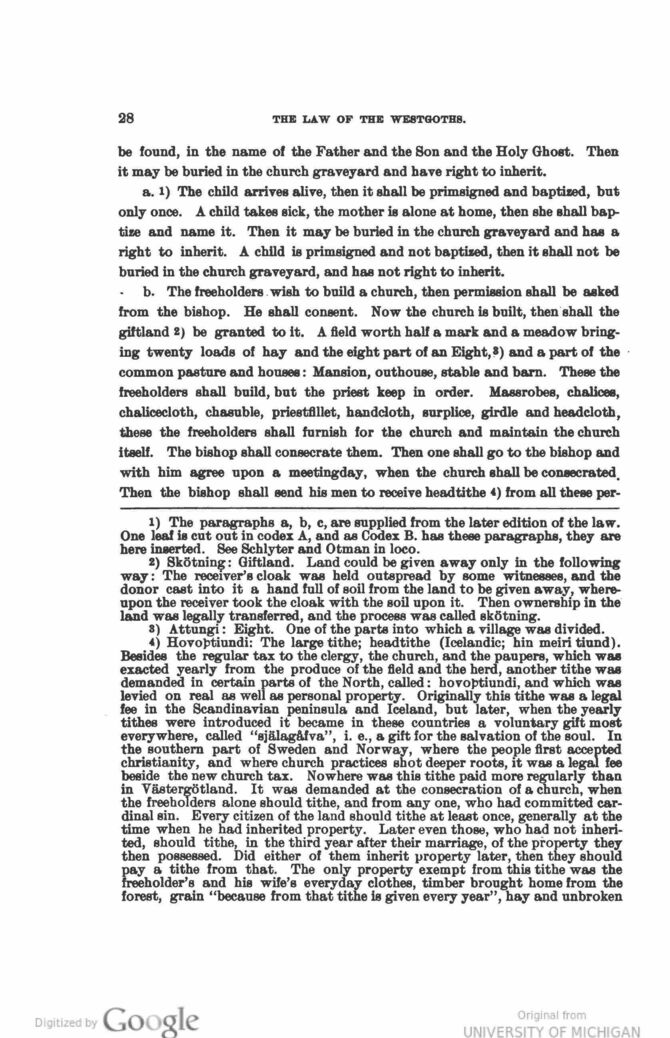
Full resolution (JPEG) - On this page / på denna sida - Sidor ...

<< prev. page << föreg. sida << >> nästa sida >> next page >>
Below is the raw OCR text
from the above scanned image.
Do you see an error? Proofread the page now!
Här nedan syns maskintolkade texten från faksimilbilden ovan.
Ser du något fel? Korrekturläs sidan nu!
This page has never been proofread. / Denna sida har aldrig korrekturlästs.
28
THE LAW OF THE WE8TGOTH8.
be found, in the name of the Father and the Son and the Holy Ghost. Then
it may be buried in the church graveyard and have right to inherit.
a. 1) The child arrives alive, then it shall be primsigned and baptized, but
only once. A child takes sick, the mother is alone at home, then she shall
baptize and name it. Then it may be buried in the church graveyard and has a
right to inherit. A child is primsigned and not baptized, then it shall not be
buried in the church graveyard, and has not right to inherit.
b. The freeholders wish to build a church, then permission shall be asked
from the bishop. He shall consent. Now the church is built, then shall the
giftland 2) be granted to it. A field worth half a mark and a meadow
bringing twenty loads of hay and the eight part of an Eight, and a part of the
common pasture and houses: Mansion, outhouse, stable and barn. These the
freeholders shall build, but the priest keep in order. Massrobes, chalices,
chalicecloth, chasuble, priestflllet, handdoth, surplice, girdle and headcloth,
these the freeholders shall furnish for the church and maintain the church
itself. The bishop shall consecrate them. Then one shall go to the bishop and
with him agree upon a meetingday, when the church shall be consecrated.
Then the bishop shall send his men to receive headtithe 4) from all these per-
1) The paragraphs a, b, c, are supplied from the later edition of the law.
One leaf is cut out in codex A, and as Codex B. has these paragraphs, they are
here inserted. See Schlyter and Otman in loco.
2) Skötning: Giftland. Land could be given away only in the following
way: The receiver’s cloak was held outspread by some witnesses, and the
donor cast into it a hand full of soil from the land to be given away,
whereupon the receiver took the cloak with the soil upon it. Then ownership in the
land was legally transferred, and the process was called skötning.
s) Attungi: Eight. One of the parts into which a village was divided.
4) Hovoptiundi: The large tithe; headtithe (Icelandic; hin meiri tiund).
Besides the regular tax to the clergy, the church, and the paupers, which was
exacted yearly from the produce of the field and the herd, another tithe was
demanded in certain parts of the North, called: hovoptiundi, and which was
levied on real as well as personal property. Originally this tithe was a legal
fee in the Scandinavian peninsula and Iceland, but later, when the yearly
tithes were introduced it became in these countries a voluntary gift most
everywhere, called "ajälagåfva", i. e., a gift for the salvation of the soul. In
the southern part of Sweden and Norway, where the people first accepted
Christianity, and where church practices shot deeper roots, it was a legal fee
beside the new church tax. Nowhere was this tithe paid more regularly than
in Västergötland. It was demanded at the consecration of a church, when
the freeholders alone should tithe, and from any one, who had committed
cardinal sin. Every citizen of the land should tithe at least once, generally at the
time when he had inherited property. Later even those, who had not
inherited, should tithe, in the third year after their marriage, of the property they
then possessed. Did either of them inherit property later, then they should
pay a tithe from that. The only property exempt from this tithe was the
freeholder’s and his wife’s everyday clothes, timber brought home from the
forest, grain "because from that tithe is given every year", hay and unbroken
<< prev. page << föreg. sida << >> nästa sida >> next page >>